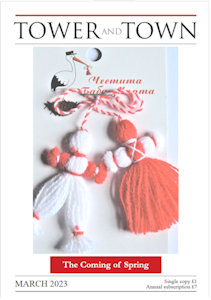

Tower and Town, March 2023 (view the full edition) (view the full edition)A Good ReadI don't know why, but when I have anxiety dreams it's always the night before my History A Level, and I haven't studied anything at all and am completely clueless. (For the record, I did scrape a pass, all those years ago.) Whether or not reading What is History Now edited by Helen Carr and Suzannah Lipscomb would have bumped me up a grade it's too late to say, but I have enjoyed it. It's a collection of essays, by a diverse range of authors, considering approaches to historical study and writing, and how we interpret history today. Can we ever know the past, and anyway isn't 'knowing' fairly subjective? History as a genre is always popular in one form or another - just look at television dramas, films and novels - but we need more than a straightforward progressive narrative, or 'pub quiz' knowledge to try to understand the past. Calling Kipling's honest serving men into play is a beginning, asking 'What happened, when and where, to whom?'. But then we need to move on to 'Why did it happen?', and perhaps most importantly 'How do we know about it, and is that really all there is to know?' There are people who object to what they view as 'revisionist' history, but by looking for the gaps in the records which are, as we know, kept by the winners, we can see there are many more stories and other, wider perspectives. Each chapter has a list of further reading if you want to pursue any of the topics - history of faith, of disability, imperialism for example - in more detail. Please don't blame me if you start having undone-prep-anxiety dreams of your own though... There is no-one alive today who can remember how it felt to fight in trenches during WW1, and of course - see above - experiences are/were different and diverse. But people will continue to try to imagine and describe the past, and some are more successful than others. Alice Winn's first novel In Memoriam convincingly depicts the trenches, public-school life and friendships (loosely based on Marlborough College) and gay love. Absorbing and moving, the author seamlessly alludes to WW1 literature and memoir, reminding readers how terrifyingly young the combatants were. It's so confidently and economically written, largely in dialogue. Descriptions of the physical and emotional mutilation of bodies and personalities are uncompromising, but not over-done. A really impressive debut. Debby Guest |